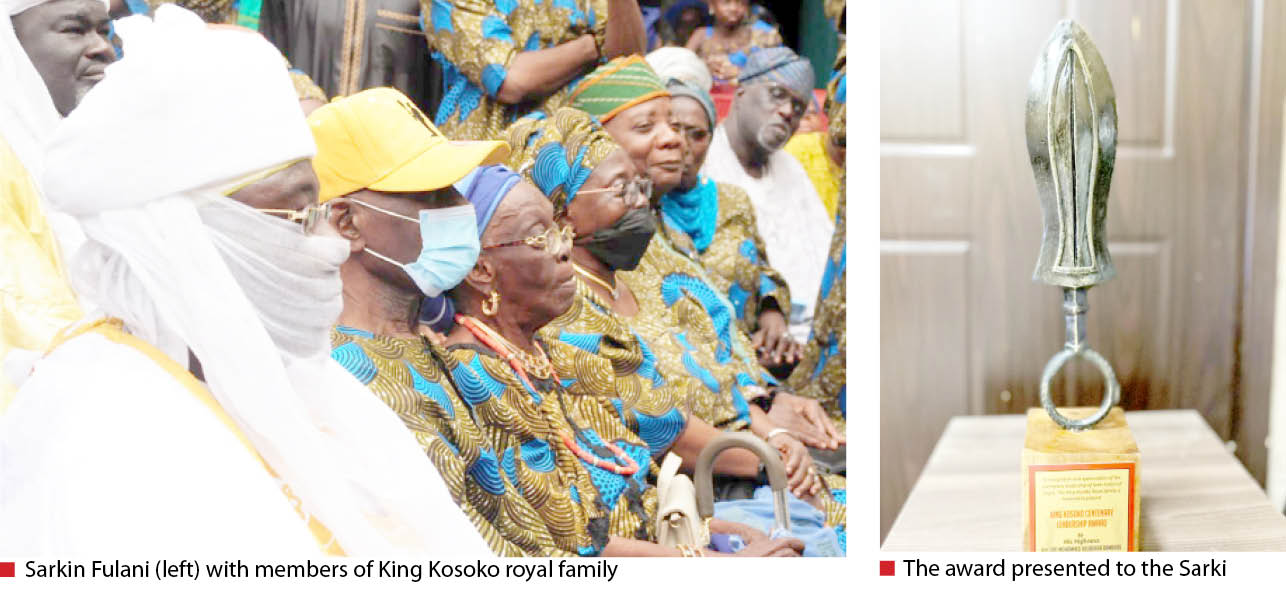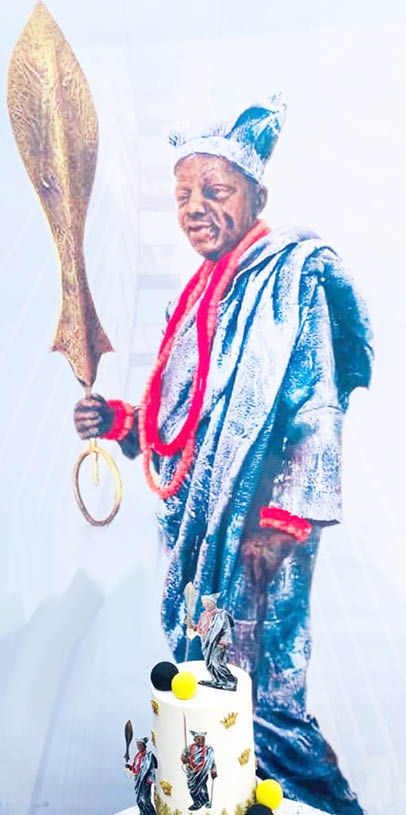Day Fulani renewed 160-year friendship with Lagos royal family
Recently, the Sarkin Fulani of Lagos State, during a visit to the Kosoko ruling family, re-enacted a 160-year-old history of Fulani existence in the state, Daily Trust Saturday reports. The Hausa-Fulani community in Lagos State has grown beyond the status of ordinary settlers to become an integral part of what constitutes the Centre of […]

Recently, the Sarkin Fulani of Lagos State, during a visit to the Kosoko ruling family, re-enacted a 160-year-old history of Fulani existence in the state, Daily Trust Saturday reports.
The Hausa-Fulani community in Lagos State has grown beyond the status of ordinary settlers to become an integral part of what constitutes the Centre of Excellence. Over the years, members of the community have lived peacefully with their host and played their part in sustaining peace and harmony. This is why inter-tribal war is seldom heard in the state.
- Will chain of endorsements deliver Kano for Tinubu?
- Marriage should be treated as an institution – NGO founder
This was the abiding philosophy of the present Sarkin Fulani of Lagos, Alhaji Mohammed Bambado 11 when he recently paid a visit to the Kosoko family in celebration of their 160-year-old relationship, which could be traced to King Kosoko.
Daily Trust Saturday reports that the first batch of Fulani settlers in Lagos, who were majorly kolanut traders, according to history, were hosted by the then reigning King Kosoko, the Oba of Lagos in his palace at the present day Lagos Island.
King Kosoko was a member of the Ologun Kutere royal family, who reigned as Oba of Lagos from 1845 to 1851. It was during his reign that the first set of Fulani settlers were said to have arrived Lagos in the 18th century and were received with open hands.
The first acknowledged leader of the new settlers, known as Usman Salgare, emerged in 1907, effectively laying the foundation of a structure upon which a leadership hierarchy was built.

The Fulani have a rich history of peaceful relationship with their host communities.
Years later, Sir Muhammadu Bambado became the leader of the emerging Fulani community in the state. He was described as a bold and enterprising merchant, who, in his visionary drive, further deepened the relationship between the Fulani and the host Lagos community, as well as gradually building a thriving business empire that grew on Lagos Island.
From his abode within the Kosoko precinct of Lagos Island, Bambado’s business acumen and untiring entrepreneurial drive gave him a head start as he made his foray into different business ventures, said a member of the Fulani community.
Sir Bambado went a step further to serve as a veritable liaison personage between visiting Hausa and Fulani from northern Nigeria, West Africa, Central Africa and the host Yoruba community of the old city of Lagos.
Beyond serving as a liaison personage, Bambado also made his expansive home available as a resting place and contact point for northern traders on business visits to Lagos, as well as an abode for people from the North until they were able to get their footing in the new environment.
From that little beginning, a solid foundation for an enduring relationship was laid. With a symbiotic communal bond, the Fulani community has been able to find a home in Lagos, where they are recognised as veritable stakeholders and partners in the progress of Lagos.
From Sir Muhammadu Bambado, the baton of leadership was handed over to his son, Nasidi Abubakar Bambado, who took over the reign of leadership when his father died in 1969 to further the existing peaceful and cordial relationship with their host community.
It is on record that Nasidi continued in the tradition that gave due respect to the established cultural norms inherent in their host community, apparently following the steps of his late father and predecessor.
In 1994, Alhaji Muhammadu Bambado 11 took over the reign as the Sarkin Fulani of Lagos and the chairman of the Council of Fulani Chiefs in the South West. He built on the tradition of fostering peaceful and harmonious relationship in Lagos, believing that members of the Fulani community can transact their businesses peacefully and contribute to the economic prosperity of the state only in an atmosphere of peace.
His recent intervention in the Alaba Rago International Market tussle was a case in point. He believes that everything possible must be done to sustain the peace.
And the exultant visit to the family of King Kosoko was a further exemplification of the place of the Fulani in a mega city like Lagos, one that must be nurtured, sustained and cherished forever.
The Sarkin Fulani believes that a friendship nurtured over a century and half ago deserves to be oiled at every given opportunity.
The visit of the Sarkin Fulani, which invoked feelings of nostalgia and an age-old camaraderie, coincided with the celebration of 162 years of the return of King Kosoko after the bombardment of Lagos when he and his followers made an exodus to Epe and later returned triumphantly on over 100 canoes with his chiefs and followers to Ereko waterfront in Lagos Island.
Amidst singing and dancing, the motorcade of the Sarkin Fulani, which took off from his palace in Surulere, was received by residents of Kosoko and its environs.
Descendants of King Kosoko, led by Alhaja Mutiat Ashabi Abimbola Alli Balogun, received the Fulani leader, all dressed in ankara fabric, locally known as aso ebi.
Bambado 11, who was born in Lagos like his father, while acknowledging the age-old relationship between the family and the King Kosoko royal family, declared the readiness of the Fulani community across the country to live in peace with members of other ethnic nationalities.
He reiterated the commitment of the Arewa-Fulani community in Lagos to maintain peace and improve socio-economic activities in the state.
Bambado recalled that the relationship between Fulani and the Kosoko family “has largely helped in strengthening the successful communal bond between the Fulani and the host community.
“The cordial relationship has also helped in opening new frontiers of friendship, networking across tribal lines within and beyond the Sarki’s immediate environment,” he added.
He advised all tribes, especially Yoruba, Fulani and Arewa communities to keep religion and politics aside “so as to continue with the true relationship that existed between their forefathers as this is the purpose of today’s celebration.”
Bambado reiterated that he had been able to boost the communal spirit and deepen cultural ties amongst component communities in Lagos and the South West.
“Without doubt, conscious efforts have been made within this period in building on the foundation of friendship, trade and cultural renaissance already laid by our forebears.
“Finding a home away from home is not only a strong rallying point but also a mix that accentuates the strength and resolve of the Fulani to live together in peace and harmony among other component Nigerian tribes,” he further said.
The general secretary of the Kosoko family, Prince Sikiru Kosoko, who took the visitors on a tour to the mosque built by the late king for the Fulani and Arewa people to worship, as well as the house where the great Sarki and Oba lived, described the then Sarkin Fulani (Bambado 1) as a father to all.
Speaking on the significance of the visit, he said, “This is a wonderful thing. You can see me speak Hausa language; I learnt it from this same house. Alhaji Bambado was my uncle. I and his brothers went to the same school. When we were young, we counted money from Friday to Sunday. Every Friday, once we finished school, they were in their room. We would count money with them until the following day. There has been a very good relationship between the Kosoko royal family and the Hausa-Fulani community.”
Prince Kosoko said the royal family believed in one Nigeria; hence the friendship they have nurtured with the Fulani-Hausa community.
He also said, “The late Sarki was a father to all. There was no time he didn’t give us money. He knew when we would pay school fees, and before you knew it he would just give you N1,000, which was like a million naira then.”
The climax of the celebration was the presentation of the King Kosoko Centenary Leadership Award to the Sarki Fulani in recognition of his exemplary leadership.
